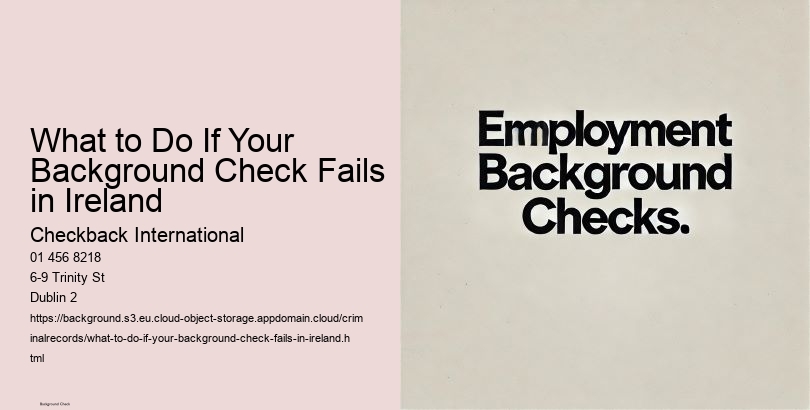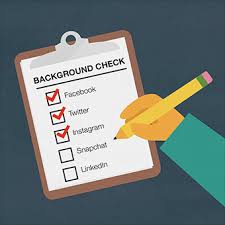

A candidate who fails to meet PSA standards during the vetting process may not qualify for the position. Different sectors need particular vetting procedures, such as anti-fraud checks for Airside Pass applications, consumer credit assessments of bankruptcy and insolvency records, and additional screening for cash-in-transit roles. The customer care team at support@checkback.ie answers questions about document requirements and maintains vetting standards compliance.
These include 5-year background screenings for security service providers, electronic security installers, and access control personnel. Documentation storage follows specific guidelines, with automatic deletion protocols implemented after legally required retention periods.3.
Criminal Records Check: This shows a candidate's criminal history to determine their behavior and character.2. If you receive a negative background check result, you can appeal the decision.
S. Companies praise how screening checks meet their specific requirements.
The process also requires financial and medical declarations, plus screening against international criminal records. How Does GDPR Impact the Storage of Background Check Data? Proper handling of personal information remains essential.4.
Create written policies outlining the screening requirements for different position levels, including specific checks required for roles in controlled functions.2. Data Examination: Complete checks against multiple internal and external databases.3.

PSA vetting takes 21 days, though this can reduce to 10 days when applicants submit all required information promptly. This process helps with background checks of candidates who have lived in any of the 26 participating EU states. The combination of criminal record reviews and credit checks demonstrates how organizations prioritize safety and integrityPre Employment Vetting in IrelandPre-employment vetting in Ireland includes several screening processes such as European Criminal Record Checks, consumer credit assessments, and fitness evaluations.
The ECRC works well for organizations involved in cross-border tenders, allowing them to check the criminal history of potential employees. Work history, education records, and financial information may be needed based on job specifications and industry rules.
These reports contain several key elements that show a detailed financial profile of individuals. Applicants undergo screening through the National Police Service (An Garda Sìochána) and international law enforcement agencies when candidates have lived abroad.
Practical Aspects of Vetting Process: Timeliness and CostsWhen reviewing background checks, companies need to weigh the practical elements of the vetting process, including time and cost factors. This approach allows Irish organizations to participate in cross-border tenders while maintaining consistent vetting standards across European operations.
Medical records stay private between medical providers and patients unless release authorization is given. The quick process helps recruitment and gives companies confidence that new hires meet compliance standards. Organizations can conduct background checks on remote workers located outside Ireland while following data protection and employment regulations of both Ireland and the worker's home country.
Through examination of criminal history, educational and employment background, and personal character, these checks support the reliability and integrity of professionals in the security sector. Organizations should maintain consistent vetting procedures across all applicants while adapting to specific role requirements. Irish Business Compliance Requirements
Employment History Verification: Examines candidate work history to confirm accuracy.3. The processing period for ECRCs takes 5 to 10 working days.
The process involves collecting personal information, which undergoes review against national and international databases for criminal records and financial stability. Checkback works with UK recruitment teams to provide BS7858 security vetting services for airside positions.

The information collected must not discriminate or break privacy rights under GDPR rules and employment law. Importance of Background Checks in IrelandBackground checks play a major role in Ireland's business operations. The components also cover date of birth verification, bankruptcy checks, and specific screenings for regulated sectors like financial services and aviation.
Organizations can get multiple ECRCs for candidates with different European address histories through a central application process. Are Social Media Profiles Legally Considered During the Vetting Process?
Any gaps in employment must be accounted for through statutory declarations, particularly for periods of self-employment or unemployment. Credit and Financial Checks: Reviews financial status of potential employees for positions of trust.

This standardized method allows quick candidate screening and hiring decisions across European jurisdictions. You need to show valid identification to get your records. Documents needed include proof of identity, address history for European residency, educational certifications, and employment references.
Different industries and organizations may have different time requirements. Past failed vetting checks can affect later background checks based on the specific rules and requirements being used.
This speed helps organizations with urgent hiring needs while meeting industry standards. Standard ECRC reports take 5-10 working days2.
These standards establish requirements for employment screening and require thorough knowledge and application. PSA-approved vetting service providers conduct the process while following data protection regulations.

ConclusionEmployee background checks in Ireland continue to become more thorough, which helps create safe and compliant workforces. ConclusionPre-employment vetting in Ireland functions as a core business process combining compliance requirements with risk management. The checks must match job requirements without affecting candidate privacy rights.
The company maintains active social media channels for updates and communication. These checks help verify information and assess suitability for positions.1.
Remote work background checks also review a candidate's experience with remote technology and data protection practices. Companies appreciate how background checking providers handle complex information professionally and discreetly.
Limited access to criminal records makes the process difficult for jobs that need Garda vetting. They contribute to creating a trustworthy and secure business environment.

No, background checks do not affect your credit score as they do not involve a credit inquiry that would impact the score.
A background check in Ireland involves reviewing a person's criminal, financial, or personal records to assess their suitability for a role or position.
Information about spent convictions, certain types of personal data, and other protected characteristics under GDPR is off-limits unless specifically relevant and lawful to access.
Handling involves assessing the relevance to the job, discussing findings with the candidate, and considering legal and ethical implications.
Signs include transparency about services, compliance with legal standards, positive reviews, and strong data protection practices.
While not specific by law, many IT positions require checks due to access to sensitive or proprietary information.
It depends on the industry and role, but typically every 2-3 years or when significant changes occur in the individual’s role or responsibility.